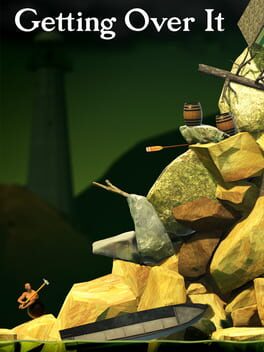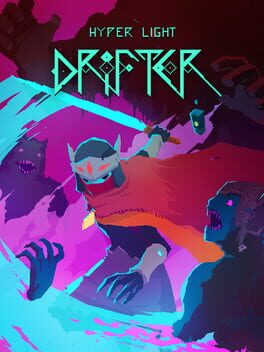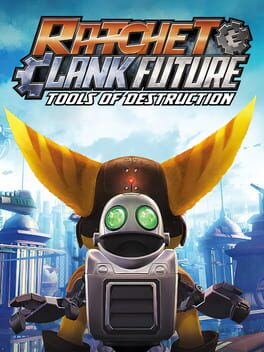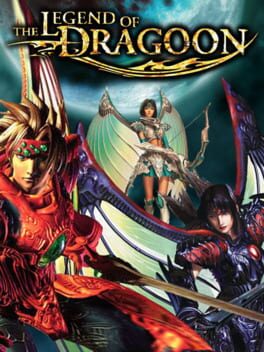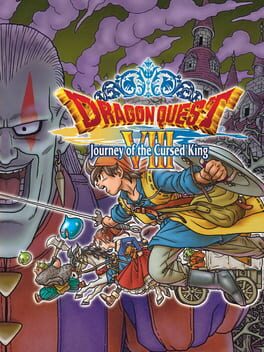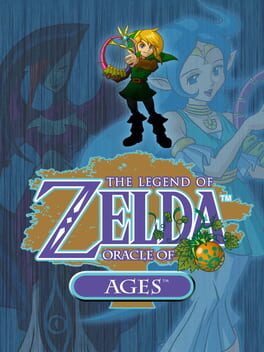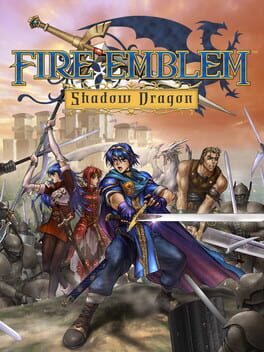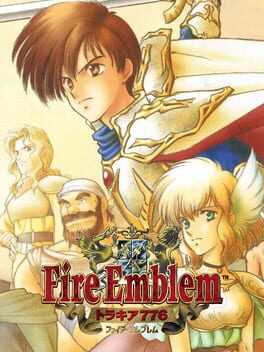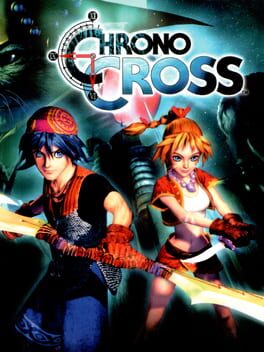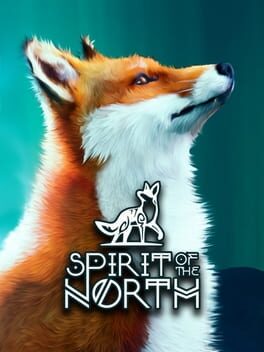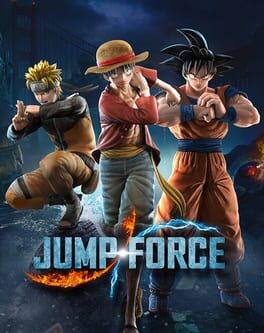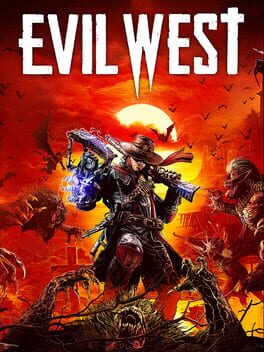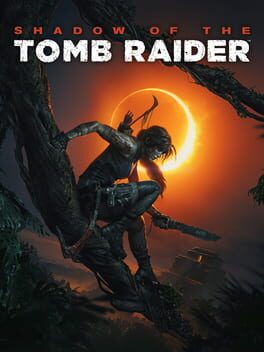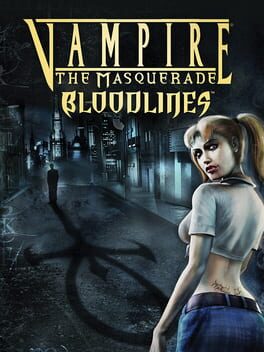Arus
240 Reviews liked by Arus
Easy to dismiss this as a shallow rage-game with some Stanley Parable esque musing laid over the top, but crucially unlike Stanley the philosophy here is conveyed mechanically and it would work entirely without the voiceover, which only dips in occasionally rather than dominating the experience.
The VO is there to initially convey 1. this game has more thought behind its design than it may first appear and 2. that it is making a point (so power-on that noodle). And then 3. to gently remind you that it's about perseverance, patience, taking a deep breath and going again whenever it's detected you might be particularly likely to send your keyboard through a wall. It doesn't quite say so outright, but the inspirational quotes and music choices, while often funny, come across more as a statement of empathy than ridicule.
It's not trying to make you mad, it's trying to show you that frustration ain't shit, the path of good humor is available even when you have every reason to let anger take the wheel. Zen by way of torture: evoke the negative emotion so you can master it. Mr. Foddy is no doubt going to pop into my mind with some line the next time I have a real-world blunder. And it's genuinely a better take on gamified mindfulness than any of the more explicit attempts out there. It's the Dark Souls (take a drink) phenomenon stripped down to its purest essence - the cycle of "are you shitting me" -> "wait maybe I can do this" -> "I WILL do this" -> repeat.
Barely made it past the devil's chimney after a trillion failures, and fell right back to the start shortly after. I'll consider myself sufficiently tortured for now but will no doubt be returning sooner or later to bang my head on this mountain and remind myself that I too contain a share of man's indominable secret ability to always try, try again.
The VO is there to initially convey 1. this game has more thought behind its design than it may first appear and 2. that it is making a point (so power-on that noodle). And then 3. to gently remind you that it's about perseverance, patience, taking a deep breath and going again whenever it's detected you might be particularly likely to send your keyboard through a wall. It doesn't quite say so outright, but the inspirational quotes and music choices, while often funny, come across more as a statement of empathy than ridicule.
It's not trying to make you mad, it's trying to show you that frustration ain't shit, the path of good humor is available even when you have every reason to let anger take the wheel. Zen by way of torture: evoke the negative emotion so you can master it. Mr. Foddy is no doubt going to pop into my mind with some line the next time I have a real-world blunder. And it's genuinely a better take on gamified mindfulness than any of the more explicit attempts out there. It's the Dark Souls (take a drink) phenomenon stripped down to its purest essence - the cycle of "are you shitting me" -> "wait maybe I can do this" -> "I WILL do this" -> repeat.
Barely made it past the devil's chimney after a trillion failures, and fell right back to the start shortly after. I'll consider myself sufficiently tortured for now but will no doubt be returning sooner or later to bang my head on this mountain and remind myself that I too contain a share of man's indominable secret ability to always try, try again.
Hyper Light Drifter
2016
Years have passed since I’ve played my beloved Hyper Light Drifter. I wanna say I played this in 2016(?), a shrimple 14 year old girl who only knew it from a 20 second twitter clip that was rlly emotionally evocative. Didn’t know one thing about the gameplay, went fuck it we ball mode and played it. It was, back then, one of my favorite games ever, and over the years I began to doubt that. It’s no-dialogue story gimmick, good music, and catchy title were the only bits that stuck with me as years passed. I thought I’d been duped a bit emotionally by some easily marketable ideas, and that I wss some kinda ‘cool games poser’.
Do you know how happy I am to report that I was right in this case? I’ve been right a lot in this way recently- replaying Soul Hackers and Bastion lately showed me that I actually underrated or didn’t fully grasp how good some of these games were, and I’m really glad I hissed away my initial urge to avoid childhood joys out of embarrassment.
Here’s some history I think is an interesting little primer: I like three of the Zelda games. Played most of em. Like 15 of them probably? I genuinely hate all but three: Zelda 1, Minish Cap, and Four Swords (I’m a bit of a Game Boy Bitch it seems. Never had one growing up but I am!). Zelda 1 is like- one of the first games I recall playing. My dad’s parents sold their childhood SNES and it’s games but I did grow up using their old NES for some reason. They amassed a pretty good selection I think given the fact some weird poor kid from the middle of nowhere was making the buying decisions: Zelda 1 and 2, Blades of Steel, NES Golf, Final Fantasy 1, and Mario 2. I played the hell outta Zelda 2 the most I think. It was kinda infuriating! I wanted all the answers!
Later on in life, I really took a liking to Zelda 1. It’s simple, everything’s pretty to the point, and there ain’t many games like Just Zelda 1 made today. Like- you’ll have kinda similar things, right? But then there’ll be an extended segment that makes you go “….Oh. That’s Link To The Past, right.” and it kills the enjoyment I have, genuinely! Just think of LttP- ugh! What a- what a fucking specific and weird and unapproachable dull thing. Link to the Past.
Anyway- what I like in Z1 is it’s specificity and simultaneous lack thereof. Every time I get an item in Zelda 1, I know what it does immediately. If it’s long enough since I’ve upgraded a piece of equipment, I can feel a hankering for the eventual upgrade of it. If I ain’t seen a secret area in a bit, my mind tunes to look for them effectively.
Most importantly, though: the plot (however simple it is in Zelda 1) is a transfer of information. You don’t make a lot of active plot progress until the end of the game in Zelda 1. You have the NES game’s manual to tell you what is happening, and you have whatever story clues are contained in the individual moments. What’s happening here, though, is a structured pattern of plot-by-learning. Not exposition, really. Just other people having info, and the story forming as you’re given more context for how it all concludes. Nothing is ‘happening’, though. However, this is story a type of story I find universally compelling. Especially once you get into the nitty-gritty- who else knows that thing you just learned, and why didn’t they tell you before?
Zelda 1’s story isn’t that interesting, really. Like let’s be honest- I’m not gonna call it the masterclass in simple plot communication. But like…..I certainly remember it more fondly today than anything that happened in Ocarina looking back. Hyper Light Drifter takes the addicting and lovely parts of this structure to the extreme: information is conveyed through pure emotional connection. You see images, hear some tone-setting music, your heart does the rest of the work. You really do not need to hear words, you just need to understand at the base level what is most important in each individual scene.
Heck, it’s even got the hyperfocus on an underground dungeon world!
There’s a tendency to call this game cryptic that I really despise, though. It’s not. There’s this stupid thing where you can get the story of the game by obtaining these tablets that translate everything about the backstory and uh…you don’t need that. I’m the Hyper Light Hypewoman and I’m probably never doing it, honestly! Each part of this game is perfectly communicated. If you think there’s something missing it’s likely not that you misunderstood anything- it’s just That Simple, and your brain expects more.
What happens, as I see it- is incredibly simple. Our main character, THEE Hyper Light Drifter, awakens to find a disease they’ve had for a while worsening. They start blacking out for portions, seeing these visions of a beast killing them and sparking the end of humanity. Usually, at the end of these visions, a scary ass dog appears leading them in different directions. The Drifter trusts this dog for no good reason. Really, they shouldn’t based on the facts: these visions of the future they start getting feature the dog adjacent to themselves drowning within another creature’s maw, and civilization as a whole getting blown the fuck up.
We get context for the creature that will kill us and it’s supercomputer papaw throughout 4 episodic chapters. Universally, people are hurt by it after thinking they could approach it like any other situation. Not even the computer in some cases: just other species of lil peoples that suddenly get possessed by murderous ideology. These people have NO reason to trust others. Neither do you, kinda!
Another driftin’ sick fellow, though, dies shortly after risking life and limb to protect you. This reaffirms the Drifter’s inherent trust in others, and once the time comes, their trust is rewarded. They defeat the beast and escape alive and healthier after the scary ass dogthing leads them to safety. They’ve protected the world, but disabled their method of escape (the supercomputer that controlled the elevator system between the lower world and the surface). They will die, but alone with the dog and no one else now. Not from their painful sickness. It’s not perfect, but it could be considered better. And not to mention, life-affirming: it’s so difficult to trust others. I’ve been burned basically every time I’ve done it. It’s nice to consider this impulse still might not be worthless.
Hyper Light Drifter, overall, is a game about constant trust. It is a game full of secrets, where the artist's touches prompt you and reward you for trusting them. There's a universal Secret Symbol: you see it, you know something's there. Sometimes it's just a room with a key for ya to take. Isn't that nice? A lot of the times you land in a three-screen dungeon leading up to, you guessed it, a key. Sometimes it feels like you're being tricked. Could be a trick, even, honestly. But you always get a lil treat for your efforts. A reward for handing over your trust. There's a lot more about the game's design I think supports this philosophy but like- number one, I'm just gonna be repeating my words for like six more paragraphs if I do that, and number two: you don't want that at all. Like duh. That would blow. Not sure if what's about to follow is better, but like you'd hate it either way so I'll take those odds.
Okay, we already toyed with doing some Tim Rogers self-obsessed storytime bullshit during the Zelda Talk, but like- you either closed this review cuz of that or you’re itching for more. Ya want more? Oh, I got more.
In 2019 I was diagnosed with paranoid schizophrenia. I have never told my family this, and I didnt tell a single person in my life until 2023. It's like- a fairly well known fact now. In my everyday life, things have gotten harder to manage vis-a-vis that, but y’know, back then it was simple: my inner monologue was hateful towards myself, and I would sometimes say things out loud and immediately recognize I was having a vivid memory-hallucination so strong I forgot where I was. Between then and now, we’ve got one major difference: trust issues. It’s about to get a little heavy so y’know. Trigger warnings and what not. There’s like- usually two or three things people talk about when they say that, so I hope you know to save this tab for later if that hurts right now.
In the years between then and now, I’ve lost every person I trusted for the most part. Most of my childhood friends killed themselves or were killed by their families. One of these particular suicides, which happened in 2017, I walked in on after it had happened. Which was a lot to work with as a teen. There were things I promised them I’d do I never got to, and vice versa. Obviously I dont like- blame any of them. Thats a really unfair thing to do, I think. But it really hurt my ability to trust others. Still, though, I had to actively try to trust people when I could regardless of how much it was hurting me to do so. I've always been a hopeful little soul, and people looked to me constantly for inspiration or to uplift their mood. When you're met with all that, you can't let that crack at all. You have to be this perfect emblem for others, even though it sucks. For a long ass time, I did trust like- one particular person a lot (genuinely!) and that isn’t true any more. You’ll remember when I threw out 2023 earlier? They helped me a lot starting in like- 2022 to help me get past a lot of this shit. We talked nearly every day for like a year. They were kind in the moment when I tried to talk about the symptoms of my schizophrenic disorder which was like- pretty new to me! Hadn't had much of a chance to talk about it before, but now here's someone who knows all the terminology that I'm having to use right now!
So, early 2024 rolls around and I have a crazy schizophrenia hallucination episode. I live alone with no in-person support network at this point. I try to kill myself the same way my old best friend did back in 2017, just in a public park at night instead of a house. At some point shortly after I tell them this, they just never talk to me again. I shouldn’t say never- I still text them sometimes, they might respond with a simple sentence once every month. If I try and ask how they’re doing or if we can talk soon, it’s left on read. If I say “Hey I watched that movie you mentioned.” there’s a one in five chance they say “Cool, that one’s good.”
Needless to say- much of my day now is spent grappling with trust issues. Like most of the day. It’s my fulltime job type shit. caused not exclusively by this new issue. But it's certainly not helping, right? I do not trust any one which, y’know, sucks! That used to be like- easy to do! However stupid it might be, though, if someone asks me to trust them with something I do as asked. Always.
I am a quitter in a lot of ways, and a real self-aware idiot, but let one thing be known: I try the hell outta it when I do that shit. I have crazy trust issues that make me think that every kind act done to me is part of some larger ploy. That they only intend to use and betray my trust later. Every time I’ve ever had the “oh this person’s playing nice they Actually Hate You” alarm ring, I’ve been correct.
But like- it feels stupid to let the Brain Disease Currently Putting Me Down win, right? That’s my Real Fucking Life Vow to the world right there: I will never stop trusting people no matter how hard this shit gets. That’s what the got damn game is about. #HyperLightMentality #AntiHaterLifestyle
I guess the conclusion I want you to draw from all this info is: talk to people in your life, even if it hurts or sucks to do. Ya gotta trust people, I think, maybe. And uh- Hyper Light Drifter is a really great piece on how the power of trust extends beyond logical reason sometimes. Not in a like- sometimes you just gotta have faith bullshit happy ending way. More like- you'll have these self-aware moments where you recognize your trust in something is illogical or really unfair towards yourself, but you live with it regardless. Shouts out Heart Machine, heard they're making a weird spiritual sequel roguelike to this now? Kinda weird, right? I'm super down for whatever that is.
Do you know how happy I am to report that I was right in this case? I’ve been right a lot in this way recently- replaying Soul Hackers and Bastion lately showed me that I actually underrated or didn’t fully grasp how good some of these games were, and I’m really glad I hissed away my initial urge to avoid childhood joys out of embarrassment.
Here’s some history I think is an interesting little primer: I like three of the Zelda games. Played most of em. Like 15 of them probably? I genuinely hate all but three: Zelda 1, Minish Cap, and Four Swords (I’m a bit of a Game Boy Bitch it seems. Never had one growing up but I am!). Zelda 1 is like- one of the first games I recall playing. My dad’s parents sold their childhood SNES and it’s games but I did grow up using their old NES for some reason. They amassed a pretty good selection I think given the fact some weird poor kid from the middle of nowhere was making the buying decisions: Zelda 1 and 2, Blades of Steel, NES Golf, Final Fantasy 1, and Mario 2. I played the hell outta Zelda 2 the most I think. It was kinda infuriating! I wanted all the answers!
Later on in life, I really took a liking to Zelda 1. It’s simple, everything’s pretty to the point, and there ain’t many games like Just Zelda 1 made today. Like- you’ll have kinda similar things, right? But then there’ll be an extended segment that makes you go “….Oh. That’s Link To The Past, right.” and it kills the enjoyment I have, genuinely! Just think of LttP- ugh! What a- what a fucking specific and weird and unapproachable dull thing. Link to the Past.
Anyway- what I like in Z1 is it’s specificity and simultaneous lack thereof. Every time I get an item in Zelda 1, I know what it does immediately. If it’s long enough since I’ve upgraded a piece of equipment, I can feel a hankering for the eventual upgrade of it. If I ain’t seen a secret area in a bit, my mind tunes to look for them effectively.
Most importantly, though: the plot (however simple it is in Zelda 1) is a transfer of information. You don’t make a lot of active plot progress until the end of the game in Zelda 1. You have the NES game’s manual to tell you what is happening, and you have whatever story clues are contained in the individual moments. What’s happening here, though, is a structured pattern of plot-by-learning. Not exposition, really. Just other people having info, and the story forming as you’re given more context for how it all concludes. Nothing is ‘happening’, though. However, this is story a type of story I find universally compelling. Especially once you get into the nitty-gritty- who else knows that thing you just learned, and why didn’t they tell you before?
Zelda 1’s story isn’t that interesting, really. Like let’s be honest- I’m not gonna call it the masterclass in simple plot communication. But like…..I certainly remember it more fondly today than anything that happened in Ocarina looking back. Hyper Light Drifter takes the addicting and lovely parts of this structure to the extreme: information is conveyed through pure emotional connection. You see images, hear some tone-setting music, your heart does the rest of the work. You really do not need to hear words, you just need to understand at the base level what is most important in each individual scene.
Heck, it’s even got the hyperfocus on an underground dungeon world!
There’s a tendency to call this game cryptic that I really despise, though. It’s not. There’s this stupid thing where you can get the story of the game by obtaining these tablets that translate everything about the backstory and uh…you don’t need that. I’m the Hyper Light Hypewoman and I’m probably never doing it, honestly! Each part of this game is perfectly communicated. If you think there’s something missing it’s likely not that you misunderstood anything- it’s just That Simple, and your brain expects more.
What happens, as I see it- is incredibly simple. Our main character, THEE Hyper Light Drifter, awakens to find a disease they’ve had for a while worsening. They start blacking out for portions, seeing these visions of a beast killing them and sparking the end of humanity. Usually, at the end of these visions, a scary ass dog appears leading them in different directions. The Drifter trusts this dog for no good reason. Really, they shouldn’t based on the facts: these visions of the future they start getting feature the dog adjacent to themselves drowning within another creature’s maw, and civilization as a whole getting blown the fuck up.
We get context for the creature that will kill us and it’s supercomputer papaw throughout 4 episodic chapters. Universally, people are hurt by it after thinking they could approach it like any other situation. Not even the computer in some cases: just other species of lil peoples that suddenly get possessed by murderous ideology. These people have NO reason to trust others. Neither do you, kinda!
Another driftin’ sick fellow, though, dies shortly after risking life and limb to protect you. This reaffirms the Drifter’s inherent trust in others, and once the time comes, their trust is rewarded. They defeat the beast and escape alive and healthier after the scary ass dogthing leads them to safety. They’ve protected the world, but disabled their method of escape (the supercomputer that controlled the elevator system between the lower world and the surface). They will die, but alone with the dog and no one else now. Not from their painful sickness. It’s not perfect, but it could be considered better. And not to mention, life-affirming: it’s so difficult to trust others. I’ve been burned basically every time I’ve done it. It’s nice to consider this impulse still might not be worthless.
Hyper Light Drifter, overall, is a game about constant trust. It is a game full of secrets, where the artist's touches prompt you and reward you for trusting them. There's a universal Secret Symbol: you see it, you know something's there. Sometimes it's just a room with a key for ya to take. Isn't that nice? A lot of the times you land in a three-screen dungeon leading up to, you guessed it, a key. Sometimes it feels like you're being tricked. Could be a trick, even, honestly. But you always get a lil treat for your efforts. A reward for handing over your trust. There's a lot more about the game's design I think supports this philosophy but like- number one, I'm just gonna be repeating my words for like six more paragraphs if I do that, and number two: you don't want that at all. Like duh. That would blow. Not sure if what's about to follow is better, but like you'd hate it either way so I'll take those odds.
Okay, we already toyed with doing some Tim Rogers self-obsessed storytime bullshit during the Zelda Talk, but like- you either closed this review cuz of that or you’re itching for more. Ya want more? Oh, I got more.
In 2019 I was diagnosed with paranoid schizophrenia. I have never told my family this, and I didnt tell a single person in my life until 2023. It's like- a fairly well known fact now. In my everyday life, things have gotten harder to manage vis-a-vis that, but y’know, back then it was simple: my inner monologue was hateful towards myself, and I would sometimes say things out loud and immediately recognize I was having a vivid memory-hallucination so strong I forgot where I was. Between then and now, we’ve got one major difference: trust issues. It’s about to get a little heavy so y’know. Trigger warnings and what not. There’s like- usually two or three things people talk about when they say that, so I hope you know to save this tab for later if that hurts right now.
In the years between then and now, I’ve lost every person I trusted for the most part. Most of my childhood friends killed themselves or were killed by their families. One of these particular suicides, which happened in 2017, I walked in on after it had happened. Which was a lot to work with as a teen. There were things I promised them I’d do I never got to, and vice versa. Obviously I dont like- blame any of them. Thats a really unfair thing to do, I think. But it really hurt my ability to trust others. Still, though, I had to actively try to trust people when I could regardless of how much it was hurting me to do so. I've always been a hopeful little soul, and people looked to me constantly for inspiration or to uplift their mood. When you're met with all that, you can't let that crack at all. You have to be this perfect emblem for others, even though it sucks. For a long ass time, I did trust like- one particular person a lot (genuinely!) and that isn’t true any more. You’ll remember when I threw out 2023 earlier? They helped me a lot starting in like- 2022 to help me get past a lot of this shit. We talked nearly every day for like a year. They were kind in the moment when I tried to talk about the symptoms of my schizophrenic disorder which was like- pretty new to me! Hadn't had much of a chance to talk about it before, but now here's someone who knows all the terminology that I'm having to use right now!
So, early 2024 rolls around and I have a crazy schizophrenia hallucination episode. I live alone with no in-person support network at this point. I try to kill myself the same way my old best friend did back in 2017, just in a public park at night instead of a house. At some point shortly after I tell them this, they just never talk to me again. I shouldn’t say never- I still text them sometimes, they might respond with a simple sentence once every month. If I try and ask how they’re doing or if we can talk soon, it’s left on read. If I say “Hey I watched that movie you mentioned.” there’s a one in five chance they say “Cool, that one’s good.”
Needless to say- much of my day now is spent grappling with trust issues. Like most of the day. It’s my fulltime job type shit. caused not exclusively by this new issue. But it's certainly not helping, right? I do not trust any one which, y’know, sucks! That used to be like- easy to do! However stupid it might be, though, if someone asks me to trust them with something I do as asked. Always.
I am a quitter in a lot of ways, and a real self-aware idiot, but let one thing be known: I try the hell outta it when I do that shit. I have crazy trust issues that make me think that every kind act done to me is part of some larger ploy. That they only intend to use and betray my trust later. Every time I’ve ever had the “oh this person’s playing nice they Actually Hate You” alarm ring, I’ve been correct.
But like- it feels stupid to let the Brain Disease Currently Putting Me Down win, right? That’s my Real Fucking Life Vow to the world right there: I will never stop trusting people no matter how hard this shit gets. That’s what the got damn game is about. #HyperLightMentality #AntiHaterLifestyle
I guess the conclusion I want you to draw from all this info is: talk to people in your life, even if it hurts or sucks to do. Ya gotta trust people, I think, maybe. And uh- Hyper Light Drifter is a really great piece on how the power of trust extends beyond logical reason sometimes. Not in a like- sometimes you just gotta have faith bullshit happy ending way. More like- you'll have these self-aware moments where you recognize your trust in something is illogical or really unfair towards yourself, but you live with it regardless. Shouts out Heart Machine, heard they're making a weird spiritual sequel roguelike to this now? Kinda weird, right? I'm super down for whatever that is.
good game, but definitely needs some quality of life improvements. attack animations take 1000 years and battles can feel sluggish at times.
having to backtrack through dungeons is unnecessary and just makes the game feel longer than it actually is.
However story was pretty good imo and music slaps. Characters also have good dynamic with their own reasons for going on this journey.
unfortunately this game suffers from some major bugs during certain fights preventing you from progressing if you use a certain ability!
having to backtrack through dungeons is unnecessary and just makes the game feel longer than it actually is.
However story was pretty good imo and music slaps. Characters also have good dynamic with their own reasons for going on this journey.
unfortunately this game suffers from some major bugs during certain fights preventing you from progressing if you use a certain ability!
An excellent addition to the dragon quest series and one of, if not the best in the series.
Dragon quest 8 offers a great balance of humour and seriousness within its story.
different sets of skills to use/learn for a variety of party members, which you can decide yourself.
party members that stick with you throughout the game - i especially like the banter between them during party chats.
DQ8 is a must play whether you are a fan or just getting into the series!
Dragon quest 8 offers a great balance of humour and seriousness within its story.
different sets of skills to use/learn for a variety of party members, which you can decide yourself.
party members that stick with you throughout the game - i especially like the banter between them during party chats.
DQ8 is a must play whether you are a fan or just getting into the series!
I’m in a state of mind lately where I can’t seem to find any joy in anything I used to do, except not in like an emotionally distressed way so much as this. With that in mind, I’m going to say that both of these are pretty much just Link’s Awakening, again, twice, with a better color palette, and with that comes all the fun and thrills of okay top-down combat, impenetrable gameplay which necessitates keeping your eyes glued to a guide, and hours of looking for other shit and heart containers you don’t really need just because it’s there. Shelving it because it’s probably fine after all and it’s just me
Starfield
2023
This game lets me walk around looking out the windows of and meticulously hand-placing ornaments throughout a homemade, supersized approximation of an interceptor from Homeworld that I built for myself and my posh, English, spatially challenged Judge Anderson cosplayer wife to go dungeon diving in, and you’re telling me there are people who don’t enjoy it?
What’s as striking as this realisation is how much better Starfield feels to fundamentally move around in than Bethesda’s prior titles, especially in third person. Your character shifts their weight and takes a balancing step when moving from one direction to the opposite, the addition of mantling up ledges means where you can or can’t go’s significantly less ambiguous and a hefty degree of animation blending makes their transitioning between states more natural-looking. Beyond making it so that your character now actually feels like part of the world they’re in instead of indifferently gliding over it as in Fallout 3 and New Vegas, this has some positive knock-on effects in terms of environmental design.
Oblivion had its acrobatics and Fallout 4 its jetpack, but these largely weren’t able to factor into how you traversed dungeons since there had to be concessions for the inevitability that not every player would have them. In contrast, Starfield’s boost packs being practically universal alongside planetary modifiers means it can afford to get more creative in this respect. This was apparent even early on when I dropped into a cave on a low-gravity planet and had to get through it by jumping between a series of distant platforms, varying my boost timing to reach some of the taller ones like I was playing Jak & Daxter or something. Another particularly cool one let me float out of the roof of an initially closed hangar after a pirate ship arrived to give its inhabitants some backup, which I could later land my own ship inside after befriending those same pirates. Others still let me circumvent enemy encounters by way of boosting up to an overhead vent, something I might’ve missed if I were playing Starfield like one of Bethesda’s less vertical titles and never looked above me, or more colourfully via shifting between dimensions akin to that one level from Titanfall 2. The setting’s also a great help in terms of making shortcuts through these areas less conspicuous – emergency vents you have to break the seals of or imposing, computerised gates are a more natural fit for this kind of thing than what felt like every other ancient Nordic tomb having a not-so-secret collapsible door.
The semi-procedurally generated nature of Starfield’s planets means there’s always a risk of some of these places losing their lustre through repetition, but are two factors mitigating this. One, there are also no instances of Daggerfall’s ambitious but malevolently complicated RNG hellscapes and two, planets’ environmental conditions go at least some way towards keeping things varied; you’re probably not going to approach a multistorey Ecliptic tower on a nigh-zero G planet the same way you will on one where your feet barely leave the ground, for example. I’m inclined to chalk this up as a net positive partially for that reason and also because it creates a sense of not knowing how you’ll deal with what’s on the horizon even if you can eventually predict it, which is notably beneficial whenever everything’s reshuffled in a new game plus that’s conceptually reminiscent of and similarly sick as Dragon’s Dogma’s. Especially impressive was the fact that, as far as I can recall, I didn’t encounter the same alien wildlife on any two planets except when there was an in-universe explanation for it.
Some may find it dry that Starfield relegates aliens to fauna, but I find it refreshing if anything. A utilitarian focus purely on humanity, our place in the universe and what we ought to do with all that spess out there seem strangely underexplored ideas for how many sci-fi games there are, especially considering how naturally these lend themselves to RPGs specifically. Antagonists bicker over egoism versus altruism, quests commonly pose questions about how far venturing into the unknown is too far, balances of power can be tipped in situations as petty as a dispute between two local shop owners or as grand as instigating conflicts between galaxy-spanning factions, there’s always some trepidation in not knowing whether another spaceship is about to shake you down or treat you to a folk song, etc. Within the limitations of a game, it does quite a sound job of encapsulating what an eclectic bunch we are without being needlessly pessimistic about it.
As the above suggests, I don’t think Starfield’s writing particularly needs defending, in part because it’d do everyone some credit to recognise that writing in RPGs isn’t constrained to just dialogue boxes or cutscenes reflecting the outcomes of your pre-programmed “choices.” Coming across scenes like this tucked away in the collapsed shaft of an abandoned NASA facility, or spacer bases having credstiks strewn about where office appliances ought to be, gets the gears turning in my head as much as or more than any flowery bouts of exposition. In Todd Howard’s interview with Lex Fridman, he mentioned that Bethesda’s got a team specifically for arranging miscellaneous objects throughout their worlds in a way that makes them feel lived-in; although big-brained, standards-having gamers like you and me might scoff in disbelief when we trek outside our bubble and remember that Fallout 3’s not only generally very well liked but also won awards for its storytelling, it becomes easier to wrap your head around when you realise they’ve always been and continue to be ace at this.
An understated but crucial strength of all of these games which accentuates that’s also been expanded upon: Starfield lets you rotate and throw such objects with varying force in addition to being able to pick up and carry them as before. It’s got practical applications (e.g. chucking then shooting hazardous canisters), but to me its real importance is building upon an avenue of the kind of roleplaying that’s essentially unique to this developer, as well as a reason why I don’t understand what I’m supposed to be comparing it to, beyond the vaguest possible descriptors, when I read that it’s allegedly “dated.” Flipping a bucket and sticking it over Vasco’s head, orienting an object into a shopkeeper’s line of sight to prevent them from witnessing theft or otherwise messing about with physics are the kinds of things that I myself might actually do for kicks if I were really in my character’s shoes – I’m not actually a bug-themed, tanto-wielding sentai hero with a suspiciously large and well-organised stockpile of stolen food in his ship’s storage room, but the agency this one mechanic affords goes such a long way toward breaking down the barrier between character and player regardless that you could’ve fooled me.
Player agency falters a bit in other aspects like the abundance of essential NPCs, but this and occasionally finicky menus notwithstanding, I’m unsure which metrics I’m supposed to be gauging to determine that Starfield isn’t probably the best iteration of this formula in more ways than not. There’s not much to disparage here that couldn’t also be said of all its siblings ⁿᵒ ⁿᵉʷ ᵛᵉᵍᵃˢ ⁱˢ ʳᵉᵃˡˡʸ ⁿᵒᵗ ᵗʰᵃᵗ ᵈⁱᶠᶠᵉʳᵉⁿᵗ, except they weren’t counterweighted by the benefits of combat I don’t actively want to avoid whenever possible, the novelty of being able to divert power to different systems in a spaceship or a main quest climax which made me genuinely think about what I’d do in that scenario among other things. Catch me revving up the engines of the Hiigaran Beryl for another several dozen hours hereafter.
What’s as striking as this realisation is how much better Starfield feels to fundamentally move around in than Bethesda’s prior titles, especially in third person. Your character shifts their weight and takes a balancing step when moving from one direction to the opposite, the addition of mantling up ledges means where you can or can’t go’s significantly less ambiguous and a hefty degree of animation blending makes their transitioning between states more natural-looking. Beyond making it so that your character now actually feels like part of the world they’re in instead of indifferently gliding over it as in Fallout 3 and New Vegas, this has some positive knock-on effects in terms of environmental design.
Oblivion had its acrobatics and Fallout 4 its jetpack, but these largely weren’t able to factor into how you traversed dungeons since there had to be concessions for the inevitability that not every player would have them. In contrast, Starfield’s boost packs being practically universal alongside planetary modifiers means it can afford to get more creative in this respect. This was apparent even early on when I dropped into a cave on a low-gravity planet and had to get through it by jumping between a series of distant platforms, varying my boost timing to reach some of the taller ones like I was playing Jak & Daxter or something. Another particularly cool one let me float out of the roof of an initially closed hangar after a pirate ship arrived to give its inhabitants some backup, which I could later land my own ship inside after befriending those same pirates. Others still let me circumvent enemy encounters by way of boosting up to an overhead vent, something I might’ve missed if I were playing Starfield like one of Bethesda’s less vertical titles and never looked above me, or more colourfully via shifting between dimensions akin to that one level from Titanfall 2. The setting’s also a great help in terms of making shortcuts through these areas less conspicuous – emergency vents you have to break the seals of or imposing, computerised gates are a more natural fit for this kind of thing than what felt like every other ancient Nordic tomb having a not-so-secret collapsible door.
The semi-procedurally generated nature of Starfield’s planets means there’s always a risk of some of these places losing their lustre through repetition, but are two factors mitigating this. One, there are also no instances of Daggerfall’s ambitious but malevolently complicated RNG hellscapes and two, planets’ environmental conditions go at least some way towards keeping things varied; you’re probably not going to approach a multistorey Ecliptic tower on a nigh-zero G planet the same way you will on one where your feet barely leave the ground, for example. I’m inclined to chalk this up as a net positive partially for that reason and also because it creates a sense of not knowing how you’ll deal with what’s on the horizon even if you can eventually predict it, which is notably beneficial whenever everything’s reshuffled in a new game plus that’s conceptually reminiscent of and similarly sick as Dragon’s Dogma’s. Especially impressive was the fact that, as far as I can recall, I didn’t encounter the same alien wildlife on any two planets except when there was an in-universe explanation for it.
Some may find it dry that Starfield relegates aliens to fauna, but I find it refreshing if anything. A utilitarian focus purely on humanity, our place in the universe and what we ought to do with all that spess out there seem strangely underexplored ideas for how many sci-fi games there are, especially considering how naturally these lend themselves to RPGs specifically. Antagonists bicker over egoism versus altruism, quests commonly pose questions about how far venturing into the unknown is too far, balances of power can be tipped in situations as petty as a dispute between two local shop owners or as grand as instigating conflicts between galaxy-spanning factions, there’s always some trepidation in not knowing whether another spaceship is about to shake you down or treat you to a folk song, etc. Within the limitations of a game, it does quite a sound job of encapsulating what an eclectic bunch we are without being needlessly pessimistic about it.
As the above suggests, I don’t think Starfield’s writing particularly needs defending, in part because it’d do everyone some credit to recognise that writing in RPGs isn’t constrained to just dialogue boxes or cutscenes reflecting the outcomes of your pre-programmed “choices.” Coming across scenes like this tucked away in the collapsed shaft of an abandoned NASA facility, or spacer bases having credstiks strewn about where office appliances ought to be, gets the gears turning in my head as much as or more than any flowery bouts of exposition. In Todd Howard’s interview with Lex Fridman, he mentioned that Bethesda’s got a team specifically for arranging miscellaneous objects throughout their worlds in a way that makes them feel lived-in; although big-brained, standards-having gamers like you and me might scoff in disbelief when we trek outside our bubble and remember that Fallout 3’s not only generally very well liked but also won awards for its storytelling, it becomes easier to wrap your head around when you realise they’ve always been and continue to be ace at this.
An understated but crucial strength of all of these games which accentuates that’s also been expanded upon: Starfield lets you rotate and throw such objects with varying force in addition to being able to pick up and carry them as before. It’s got practical applications (e.g. chucking then shooting hazardous canisters), but to me its real importance is building upon an avenue of the kind of roleplaying that’s essentially unique to this developer, as well as a reason why I don’t understand what I’m supposed to be comparing it to, beyond the vaguest possible descriptors, when I read that it’s allegedly “dated.” Flipping a bucket and sticking it over Vasco’s head, orienting an object into a shopkeeper’s line of sight to prevent them from witnessing theft or otherwise messing about with physics are the kinds of things that I myself might actually do for kicks if I were really in my character’s shoes – I’m not actually a bug-themed, tanto-wielding sentai hero with a suspiciously large and well-organised stockpile of stolen food in his ship’s storage room, but the agency this one mechanic affords goes such a long way toward breaking down the barrier between character and player regardless that you could’ve fooled me.
Player agency falters a bit in other aspects like the abundance of essential NPCs, but this and occasionally finicky menus notwithstanding, I’m unsure which metrics I’m supposed to be gauging to determine that Starfield isn’t probably the best iteration of this formula in more ways than not. There’s not much to disparage here that couldn’t also be said of all its siblings ⁿᵒ ⁿᵉʷ ᵛᵉᵍᵃˢ ⁱˢ ʳᵉᵃˡˡʸ ⁿᵒᵗ ᵗʰᵃᵗ ᵈⁱᶠᶠᵉʳᵉⁿᵗ, except they weren’t counterweighted by the benefits of combat I don’t actively want to avoid whenever possible, the novelty of being able to divert power to different systems in a spaceship or a main quest climax which made me genuinely think about what I’d do in that scenario among other things. Catch me revving up the engines of the Hiigaran Beryl for another several dozen hours hereafter.
Had a surprisingly good time with this little bugger. The character art style grew on me, though the art stills are excellent, and the variable difficulty was honestly visionary. Had a great run on H3, a fun revisiting of Marth's story. Tight maps, pleasantly busted weapon forging, cute little prologue, can't complain.
Thracia is a beautiful video game and a bit of a standout in the Fire Emblem series. In FE you often play as a prince or princess with the support of the crown, yours or another, at your back. Knights, resources, loyal retainers, and the like. You go forth and fight for your kingdom, your friends, and what have you.
Thracia is a bit different. Leif is a minor prince in exile, and your brigade is the local militia. So much of the game is spent struggling against overwhelming odds; running away from a superior force. You have very little gold, so you need to capture enemies and steal their equipment. Every victory feels desperate and well-earned.
The game is full of bullshit. It is a bullshit game. Don't have enough keys at this very late chapter in the game? Sorry, buddy, you're softlocked. Oh, you're in the bandit gaiden? Get ready for the girl with the Thief staff to steal your equipment from across the map. Deal with it. Got a powerful unit in the middle of your army? Sorry, she got hit by the berserk staff and just killed your best healer. Walk out into the dark forest? That's a shame, this random bandit just hit you with a sleep staff, captured you, and stole all your equipment. Oh, and the boss hit you with a long range sleep staff, too. Don't even get me started on the long range siege tomes through fog of war.
The game hates you. The game spits on your face. You think you're having a continent-spanning adventure as the Hero-Prince Marth? Who the fuck do you think you are? You think you're having a geopolitical Shakespearean drama, an ancient epic with larger-than-life heroes blessed by the blood of ancient warriors, of the very gods themselves like in FE4? Get real, twerp. You're a two-bit prince with a bunch of militia troops, freedom fighters, and mountain noble knights (later), and you've got to run the fuck away before you can reclaim your kingdom. Every battle is desperate. Every victory is hard-won.
The beauty of the bullshit is that you also have bullshit. Staffs are busted. Warp across the map, who cares. Make the enemy berserk, whatever. Thief staff the boss's weapon away, what's he gonna do about it? When you're this desperate, who the fuck cares about 'fighting fair'? This game was meant to be cheesed, because it's cheesing you. It feels like the director Kaga is challenging you, personally, to a battle of wits - a contest you're going to rise to the challenge of.
One part that stands out to me is a mission later in the game, a tense defense mission where you have to hold out for reinforcements. When it is finally done, the protagonist of FE4 appears with a host of troops to bail you out and give you the thumbs up before going back to doing incredibly significant, world-saving epic shit. You, as Leif, and all of your struggles, have just been a footnote in the greater narrative of FE4. Your 16+ chapters of blood, sweat, tears and loss are just a single map to the other guy.
It's beautiful.
Most significant to me is the penultimate map, right before the finale. I won't give details of the reward, but it is the height of the game's bullshit, of its player-hostile design. Seemingly-random tiles teleport your units to a room in the bottom where they are beaten to death by enemy reinforcements coming out of stairways from which there is no escape. Fog of war concealing Berserkers with extremely high crit and damage, all but guaranteeing a one hit kill on any of your unfortunate allies. Constantly dark mages warping towards you from across the map. It is perverse. It is disgusting. It feels like something out of like a cruel romhack, like a particularly rough Kaizou Mario.
Yet it has great purpose. If you go through it, even though your best units will likely be fatigued and thus unusable in the final map, where you will need them most to actually beat the game - even though you will gain no new items, no new weapons, not even a powerful party member - you are instead rewarded with the best cutscene in the game and incredible emotional catharsis.
It is completely optional. It is in your best tactical interest to not do it. The requirements to unlock it are slightly difficult in the previous map. Yet, the game looks you in the eye, narrows its own, and asks you how much you want your happy ending. Because if you do, you'd better come and get it, motherfucker.
I love Thracia 776. I don't think we'll ever get a game in the Fire Emblem series like it again, but I deeply cherish my time with it and hope anyone else interested in Fire Emblem gives it a try, ideally after getting a few femblems under their belt.
Thracia is a bit different. Leif is a minor prince in exile, and your brigade is the local militia. So much of the game is spent struggling against overwhelming odds; running away from a superior force. You have very little gold, so you need to capture enemies and steal their equipment. Every victory feels desperate and well-earned.
The game is full of bullshit. It is a bullshit game. Don't have enough keys at this very late chapter in the game? Sorry, buddy, you're softlocked. Oh, you're in the bandit gaiden? Get ready for the girl with the Thief staff to steal your equipment from across the map. Deal with it. Got a powerful unit in the middle of your army? Sorry, she got hit by the berserk staff and just killed your best healer. Walk out into the dark forest? That's a shame, this random bandit just hit you with a sleep staff, captured you, and stole all your equipment. Oh, and the boss hit you with a long range sleep staff, too. Don't even get me started on the long range siege tomes through fog of war.
The game hates you. The game spits on your face. You think you're having a continent-spanning adventure as the Hero-Prince Marth? Who the fuck do you think you are? You think you're having a geopolitical Shakespearean drama, an ancient epic with larger-than-life heroes blessed by the blood of ancient warriors, of the very gods themselves like in FE4? Get real, twerp. You're a two-bit prince with a bunch of militia troops, freedom fighters, and mountain noble knights (later), and you've got to run the fuck away before you can reclaim your kingdom. Every battle is desperate. Every victory is hard-won.
The beauty of the bullshit is that you also have bullshit. Staffs are busted. Warp across the map, who cares. Make the enemy berserk, whatever. Thief staff the boss's weapon away, what's he gonna do about it? When you're this desperate, who the fuck cares about 'fighting fair'? This game was meant to be cheesed, because it's cheesing you. It feels like the director Kaga is challenging you, personally, to a battle of wits - a contest you're going to rise to the challenge of.
One part that stands out to me is a mission later in the game, a tense defense mission where you have to hold out for reinforcements. When it is finally done, the protagonist of FE4 appears with a host of troops to bail you out and give you the thumbs up before going back to doing incredibly significant, world-saving epic shit. You, as Leif, and all of your struggles, have just been a footnote in the greater narrative of FE4. Your 16+ chapters of blood, sweat, tears and loss are just a single map to the other guy.
It's beautiful.
Most significant to me is the penultimate map, right before the finale. I won't give details of the reward, but it is the height of the game's bullshit, of its player-hostile design. Seemingly-random tiles teleport your units to a room in the bottom where they are beaten to death by enemy reinforcements coming out of stairways from which there is no escape. Fog of war concealing Berserkers with extremely high crit and damage, all but guaranteeing a one hit kill on any of your unfortunate allies. Constantly dark mages warping towards you from across the map. It is perverse. It is disgusting. It feels like something out of like a cruel romhack, like a particularly rough Kaizou Mario.
Yet it has great purpose. If you go through it, even though your best units will likely be fatigued and thus unusable in the final map, where you will need them most to actually beat the game - even though you will gain no new items, no new weapons, not even a powerful party member - you are instead rewarded with the best cutscene in the game and incredible emotional catharsis.
It is completely optional. It is in your best tactical interest to not do it. The requirements to unlock it are slightly difficult in the previous map. Yet, the game looks you in the eye, narrows its own, and asks you how much you want your happy ending. Because if you do, you'd better come and get it, motherfucker.
I love Thracia 776. I don't think we'll ever get a game in the Fire Emblem series like it again, but I deeply cherish my time with it and hope anyone else interested in Fire Emblem gives it a try, ideally after getting a few femblems under their belt.
Chrono Cross
1999
Another entry from my List of the Thirty-Five Best Games I Played in 2023, now available à la carte:
On Chrono Cross (Or — "How I Developed a Palate for Poison")
My grandmother doesn’t live in Vermont anymore. A couple years ago, she and I went back there together and rented a place to relive those days. Naturally, the rental had some similarities to her old place. We drove around, taking in familiar sights, waiting for the rest of the family to join us. I fired up Chrono Cross for the first time one evening, and promptly came down with a case of water poisoning.
If I believed in omens, I’d take that as a bad one. I touched a game about a character who finds himself in an eerie facsimile of home, itself the strange and twisted sequel of a beloved favorite, and it left me hurling into a toilet. The water supply we’d been drawing from was unfit for human consumption. I spent the recovery period with Chrono Trigger and Dragon Quest V on DS, beneath the more familiar ceiling of a family friend’s house. I’d later start writing a non-review about how I didn’t have to play Chrono Cross, eschewing the pretense of being some aspiring member of the Backloggd “videogame intelligentsia.” I don’t need “cred,” right??
Well.
I played Chrono Trigger again in 2023 at least twice, depending on how you define a “playthrough”. The first was because I’d just finished Final Fantasy X and wanted to make some unfair comparisons. The second was because I was three-fourths of the way through Chrono Cross and…wanted to make some unfair comparisons. Even in the thick of it, I was avoiding the inevitable.
So…About the Game
Cross makes every effort possible to be anything but a clean, obedient sequel to its father. And you know what? Good. Trigger’s development was predicated on originality, and should likewise be followed up with another adventurous convention-breaker. The “Chrono Trigger 2” advocated by the likes of Johnny Millennium doesn’t appeal to me; lightning doesn’t strike twice. Still, Cross is Trigger’s opposite even in ways it really shouldn’t be.
With the exception of its original PSX audiovisual presentation, some of the most colorful and lush I’ve ever experienced, just about every one of its ideas is noncommittal and indecisive. Monsters appear on the overworld again, but you won’t find anything as deliberately paced as Trigger’s level design to elevate this from the status of "mild convenience." The conceit of its combat system is worth exploring – characters deal physical damage to build spell charges — but the deluge of party members and fully customizable spell slots amounts to a game that would’ve been impossible to balance. Level-ups are only granted during boss fights, and the gains acquired in normal battles aren’t worth the effort, so the whole thing snaps in half not 50% of the way through. It isn’t measured to account for the fact that you can take down just about everything with an onslaught of physical attacks by the midgame.
Then again, if the combat had been as challenging as the story is bizarre, I don’t know that I would’ve stuck around all the way to the end. Maybe I wouldn’t have been as gung-ho about swapping party members around and collecting them like Pokémon. Amid its spectacle and ambition, the wonder of sailing the seas and crossing dimensions, I left most events unsure of what to think, positive or negative. It wasn’t ambivalence, exactly.
SPOILERS AHEAD
It’s like this: Fairly early on, you’re given an infamous decision. One of the major protagonists, Kid, is dying of a magically-inflicted illness, and the only antidote is Hydra Humour. If you agree to go after it, you’ll find that it can only be extracted from the Guardian of the Marshes, and its death would mean the deterioration of the ecosystem which relies upon it. The dwarves and all other life in this biome would be put at risk. I weighed my options. I decided to reload a save and refuse the quest. Kid wouldn’t want her life to come at the cost of hundreds, if not thousands of others. So I start down the opposite path…
…Only to find that, in this route, a squad of human soldiers kills the hydra anyway, leaving the dwarves to flee their uninhabitable home to lead a genocidal attack on the fairies’ island to claim it for themselves. Jesus. The dwarves’ manic strangeness did little to downplay how chilling the result of my little coin flip was.
After an effort to defend the few remaining fairies and keep the dwarves at bay — leaving the survivors to process the turmoil of their new reality — after all that…it turns out that Kid is fine. She got over the illness by herself, offscreen.
For as many words as it goes on to spew, no moment of my Chrono Cross playthrough spoke louder than this one. Chrono Trigger’s party was faced with a choice — allow Lavos to erupt from the planet and drive everything to the brink of extinction, or risk everything to prevent the apocalypse. It’s a thousand years away, these three characters can live out the rest of their days comfortably and never have to concern themselves with it. They’re shown an End of Time, proof that the universe won’t last regardless of what they do, and still decide to fight on behalf of the world. It’s worth trying, if only to preserve a few more precious seconds of life for their descendants and their home.
Chrono Cross (eventually) reveals that their meddling allowed Lavos to become an even more devastating monster. We can defeat it, but who can say that won’t result in an even more cataclysmic fate? Because he lives and breathes, Serge’s timeline is worse off. It’s hard to tell whether that’s lore nonsense, self-flagellation on the game’s part, or genuine philosophizing. It wouldn’t be alone in that. As a chronic “downer,” I can’t help wondering if there’s no way to survive in the modern world without directly or indirectly participating in human suffering.
Maybe Writer/Director Masato Kato couldn’t either. He seems bent on reminding the player that they are but a speck in a cosmic puzzle, and there’s no defiant “so what?” answer to that problem. Even the thing we’ve been led to accomplish isn’t revealed until seconds before the finale of this forty hour game (and that's NOT a joke). You can’t see the credits without recognizing that it’s an unfortunate victim of mismanagement and a little too much Evangelion, but that doesn’t mean it fails to resonate. I don't think there’s another game that so thoroughly captures the existential confusion of being alive.
On Chrono Cross (Or — "How I Developed a Palate for Poison")
My grandmother doesn’t live in Vermont anymore. A couple years ago, she and I went back there together and rented a place to relive those days. Naturally, the rental had some similarities to her old place. We drove around, taking in familiar sights, waiting for the rest of the family to join us. I fired up Chrono Cross for the first time one evening, and promptly came down with a case of water poisoning.
If I believed in omens, I’d take that as a bad one. I touched a game about a character who finds himself in an eerie facsimile of home, itself the strange and twisted sequel of a beloved favorite, and it left me hurling into a toilet. The water supply we’d been drawing from was unfit for human consumption. I spent the recovery period with Chrono Trigger and Dragon Quest V on DS, beneath the more familiar ceiling of a family friend’s house. I’d later start writing a non-review about how I didn’t have to play Chrono Cross, eschewing the pretense of being some aspiring member of the Backloggd “videogame intelligentsia.” I don’t need “cred,” right??
Well.
I played Chrono Trigger again in 2023 at least twice, depending on how you define a “playthrough”. The first was because I’d just finished Final Fantasy X and wanted to make some unfair comparisons. The second was because I was three-fourths of the way through Chrono Cross and…wanted to make some unfair comparisons. Even in the thick of it, I was avoiding the inevitable.
So…About the Game
Cross makes every effort possible to be anything but a clean, obedient sequel to its father. And you know what? Good. Trigger’s development was predicated on originality, and should likewise be followed up with another adventurous convention-breaker. The “Chrono Trigger 2” advocated by the likes of Johnny Millennium doesn’t appeal to me; lightning doesn’t strike twice. Still, Cross is Trigger’s opposite even in ways it really shouldn’t be.
With the exception of its original PSX audiovisual presentation, some of the most colorful and lush I’ve ever experienced, just about every one of its ideas is noncommittal and indecisive. Monsters appear on the overworld again, but you won’t find anything as deliberately paced as Trigger’s level design to elevate this from the status of "mild convenience." The conceit of its combat system is worth exploring – characters deal physical damage to build spell charges — but the deluge of party members and fully customizable spell slots amounts to a game that would’ve been impossible to balance. Level-ups are only granted during boss fights, and the gains acquired in normal battles aren’t worth the effort, so the whole thing snaps in half not 50% of the way through. It isn’t measured to account for the fact that you can take down just about everything with an onslaught of physical attacks by the midgame.
Then again, if the combat had been as challenging as the story is bizarre, I don’t know that I would’ve stuck around all the way to the end. Maybe I wouldn’t have been as gung-ho about swapping party members around and collecting them like Pokémon. Amid its spectacle and ambition, the wonder of sailing the seas and crossing dimensions, I left most events unsure of what to think, positive or negative. It wasn’t ambivalence, exactly.
SPOILERS AHEAD
It’s like this: Fairly early on, you’re given an infamous decision. One of the major protagonists, Kid, is dying of a magically-inflicted illness, and the only antidote is Hydra Humour. If you agree to go after it, you’ll find that it can only be extracted from the Guardian of the Marshes, and its death would mean the deterioration of the ecosystem which relies upon it. The dwarves and all other life in this biome would be put at risk. I weighed my options. I decided to reload a save and refuse the quest. Kid wouldn’t want her life to come at the cost of hundreds, if not thousands of others. So I start down the opposite path…
…Only to find that, in this route, a squad of human soldiers kills the hydra anyway, leaving the dwarves to flee their uninhabitable home to lead a genocidal attack on the fairies’ island to claim it for themselves. Jesus. The dwarves’ manic strangeness did little to downplay how chilling the result of my little coin flip was.
After an effort to defend the few remaining fairies and keep the dwarves at bay — leaving the survivors to process the turmoil of their new reality — after all that…it turns out that Kid is fine. She got over the illness by herself, offscreen.
For as many words as it goes on to spew, no moment of my Chrono Cross playthrough spoke louder than this one. Chrono Trigger’s party was faced with a choice — allow Lavos to erupt from the planet and drive everything to the brink of extinction, or risk everything to prevent the apocalypse. It’s a thousand years away, these three characters can live out the rest of their days comfortably and never have to concern themselves with it. They’re shown an End of Time, proof that the universe won’t last regardless of what they do, and still decide to fight on behalf of the world. It’s worth trying, if only to preserve a few more precious seconds of life for their descendants and their home.
Chrono Cross (eventually) reveals that their meddling allowed Lavos to become an even more devastating monster. We can defeat it, but who can say that won’t result in an even more cataclysmic fate? Because he lives and breathes, Serge’s timeline is worse off. It’s hard to tell whether that’s lore nonsense, self-flagellation on the game’s part, or genuine philosophizing. It wouldn’t be alone in that. As a chronic “downer,” I can’t help wondering if there’s no way to survive in the modern world without directly or indirectly participating in human suffering.
Maybe Writer/Director Masato Kato couldn’t either. He seems bent on reminding the player that they are but a speck in a cosmic puzzle, and there’s no defiant “so what?” answer to that problem. Even the thing we’ve been led to accomplish isn’t revealed until seconds before the finale of this forty hour game (and that's NOT a joke). You can’t see the credits without recognizing that it’s an unfortunate victim of mismanagement and a little too much Evangelion, but that doesn’t mean it fails to resonate. I don't think there’s another game that so thoroughly captures the existential confusion of being alive.
Spirit of the North
2019
Before us is an unusual and even a little magical adventure, originating in Scandinavian myths. Playing as an ordinary red fox, you will plunge into an unusual and very old story, a story about many deaths and great grief. With the help of a new friend - the Spirit of the Northern Lights, the fox will have to travel, see new places and free innocent souls.
Jump Force
2019
I just recently came across this toy and she was interested. The game is a hodgepodge! The foyer is similar to the Dragon Ball Xenoverse games, the combat is a mixture of the gameplay of the Naruto Ultimate Ninja STORM and Dragon Ball Xenoverse games. As for me, it turned out pretty good, if you don’t take into account the plot - it’s just for show. Be that as it may, this is the main game in which you can select characters from different anime universes, including not only the heroes of Naruto, One Piece and Bleach, but also My Hero Academia, JoJo's Bizarre Adventure, Yu-Gi-Oh! and others
Evil West
2022
I totally understand who considers this game worse than the other two, i particularly like Shadow of the Tomb Raider, but the game does not learn with the past games.
First of all, it looks pretty as the others, in other words, graphics still good and i really appreciate this.
Now, the biggest problem to me: progression. In other two games of this trilogy, you can feel Lara becoming better and in SOTR you feel the same in all campaign.
Unfortunately, the story become worse than Rise of the Tomb Raider. It's very sad, a good story about legacy and discoveries becomes a cliche evil secret organization(It is a problem inherited from Rise of the Tomb Raider).
For me, it's the same level of Rise of the Tomb Raider, have a lot of problems and i didn't expected more. So i'm satisfied, but it's a okay game.
First of all, it looks pretty as the others, in other words, graphics still good and i really appreciate this.
Now, the biggest problem to me: progression. In other two games of this trilogy, you can feel Lara becoming better and in SOTR you feel the same in all campaign.
Unfortunately, the story become worse than Rise of the Tomb Raider. It's very sad, a good story about legacy and discoveries becomes a cliche evil secret organization(It is a problem inherited from Rise of the Tomb Raider).
For me, it's the same level of Rise of the Tomb Raider, have a lot of problems and i didn't expected more. So i'm satisfied, but it's a okay game.
Vampire: The Masquerade - Bloodlines is an awesome game and it was love at first sight, of course, being launched at 2004 has a lot of aged things and some problems related to the game itself.
First of all, i think VTMB really should to be more appreciated, it is a very precious experience. Has a deep story/lore, characters are great, good quests(until end of Hollywood and Chinatown) and it's so immersive that is hard until nowadays a game to do.
Obviously, this game is not perfect. At the end, some things looks rushed, the paths which earlier looks so natural in the end this aspect disappear, a few new good characters appears. The worst part about this game is the combat, aged like milk.Both gunplay and melee are a painful experience to going through, but i think this game really deserves an opportunity despite its flaws.
First of all, i think VTMB really should to be more appreciated, it is a very precious experience. Has a deep story/lore, characters are great, good quests(until end of Hollywood and Chinatown) and it's so immersive that is hard until nowadays a game to do.
Obviously, this game is not perfect. At the end, some things looks rushed, the paths which earlier looks so natural in the end this aspect disappear, a few new good characters appears. The worst part about this game is the combat, aged like milk.Both gunplay and melee are a painful experience to going through, but i think this game really deserves an opportunity despite its flaws.
